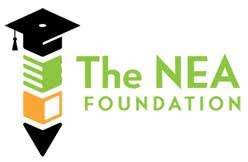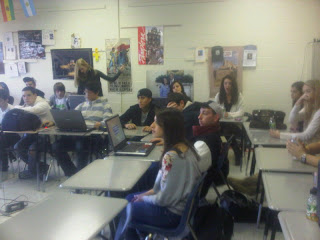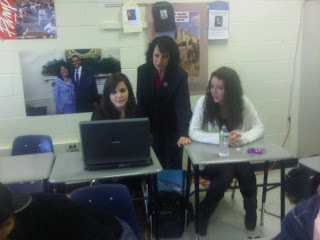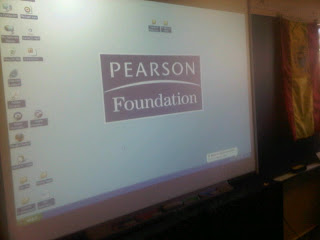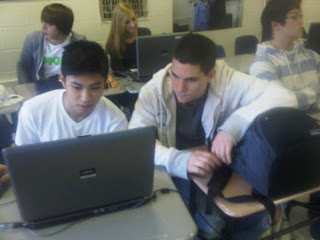
Yesterday, I had the opportunity to deliver a keynote at a wonderful two-day event held at Rider University - The Teacher Leadership Community Summer Forum. Suzanne Carbonaro and the teacher leader team that put this together are tireless and enthusiastic about what teachers can offer each other and how they can fruitfully collaborate.
Suzanne has created a Ning called Teacher Learning Community For Ed (http://tlc4ed.ning.com) which you might like to join. It is chock full of great ideas, connections and real contact with educators who are making a difference every day.
The summer forum was held in the Daley Dining Hall of Rider University. I think there must have been about 100 educators gathered who were ready to share and learn. Chris Campisano, from the State Department of Higher Education, had asked me to speak. Chris is moving on to work as the head of the teacher prep program at Princeton University. Meeting Chris has been one of the highlights I've had this year.
Chris spoke first and then Emilio Piaolo, an award winning student teacher, followed him giving the group a moving speech - the story of her student teaching experience.
Emily compared images of her favorite activity - going to the beach - to her internship experience. She talked about waves of learning, our need to sometimes tread water or survive in rough educational winds. Her words were well crafted and beautiful, leaving the audience gasping at various times. I think her words could become an important essay for teachers and student teachers everywhere to share!
I spoke after Emily to tell my stories of collaboration across the barriers of age and position in my life. Here's a part of what I said. A lot of time, during my speech, I was off the page, improvising, as the spirit would move me. This has been happening more and more as I go on the road, but I still like to have that speech in front of me as a good back up! Here is a shortened version of what I said:

"What a year it’s been! But how did I get here and how did collaboration give me the skills I’ve needed in my career of 31 years?
In 1978, I got married to Joe Murphy. Joe told me that I would be able to learn Spanish very well, if we made a pact to speak no English to each other. At the age of 22, I was so in love that volunteering to give up my native language for a year seemed like a good plan.
Joe and I went to Spain and moved into a Pension – which is a kind of family-run Inn. The Inn keepers were Marisol and Pepe – a young couple in their 20’s. They had two small children, Jose and Susana. Jose was four years old and he became my secret teacher. I spoke only a couple of words of Spanish, so I really needed help!
“Pss, Jose, Que es esto?” I would ask about every object in the room.
Jose would fall to the floor in hysterical laughter and would finally give me the word I would need again and again. My learning became a game for him. To this day, when I go to Spain and see Jose, now in his 40s, I still talk about him being my very first Spanish teacher.
In college, I had studied philosophy. As a philosophy student, I needed to care about words and use them in a precise way. Going to Spain and leaving all of those hard-won words behind to break into a new language, was indeed a challenge to me. I had to learn to be humble, flexible and finally, to see myself with humor.
But most of all, I had to get help from others.
I had to ask questions and I had to let a person with greater skills assist me – in my case, it was a four-year old, but the age difference also allowed me to let down my guard. In fact, it was a perfect language learning situation.
Fast forward a decade and you find me working at a new school for science and technology. The place was gleaming and stocked with all of the latest computers, cutting edge in 1993.
We have to remember where technology was in those days. As recently as 1981, it would take two hours to download a copy of the local newspaper at an hourly download charge of $5. Experts in those days said that even though computers might be interesting and fun, they probably wouldn't have widespread use and certainly wouldn’t make people any money!
It would have been hard to envision the internet, online shopping, workflow software and our need for the instant gratification of text messaging!
Well, there I was in 1993 in my new classroom when a very serious man walked in, in a fancy suit. We had a technology meeting at a time that I barely knew what the word might mean.
The man said: “You are now a lab manager!”
“I am?”
“Yes, do you have any questions?”
“Yes, is there, uh, training?”
“Well,” he said, "there isn’t any money for professional development.”
“Oh, uh, oh.... I seeeeeee!”
I sadly flipped through the manual. I was in “tech shock” with a useless piece of chalk poised in my hand, somewhere between tears and paralysis.
Thank goodness, a student walked into the room. His name was Mark Lois and he played an important part of my personal history.
“Como estas?” I said, trying to sound chipper.
Mark was a sensitive kid and he instantly noticed something wrong on my face, though he had only met me a few days before.
“Que pasa, Maestra?” His kind face and question helped the walls come tumbling down.
“Mark, I don’t know anything about computers. Can you please help me??”
Without flinching or making me feel foolish, Mark began my instruction.
“Do you know anything?
“No, nothing.”
“O.K., This is a desktop, this is a mouse. You move it like this, no – not up in the air, but side to side.”
I immediately felt comfortable and I let Mark teach me. Soon, I would notice kids pulling out cords, playing with computer programs and applications with an irreverent and fearless approach to technology.
When they would go too fast, I would say, “Slow down” just like I did when I was learning Spanish. Their attitude empowered me to adapt to an entirely new culture of technology, just like I had done years before with Joe in Spain when we made a pact to speak no English. The world was changing and, by golly, I was changing with it! My students taught me that I could use their matter-of-fact, playful, irreverent approach to new learning to my advantage.
Because of them, my mind was beginning to explode with a new excitement and a hopeful attitude about technology. I didn’t need to be a math genius to work with it or understand everything. I just had to be comfortable with a little momentary confusion and to develop a willingness to try different strategies, one at a time. The machine wasn’t out to get me. With a little gentle coaxing, technology and I became good friends!
Fast forward some more and bring me to last year.
I had agreed to become the cooperating teacher for Tim Riley, an outstanding student from Ramapo College. After all of my years in the classroom, I figured it was my obligation to encourage a younger colleague to find his educational dreams. Little did I know that the relationship would be so mutually constructive and personally rewarding!
I had met Tim during our interview a month before. Because I teach upper-level Spanish, I wanted to make sure his proficiency was up to speed. It was and I approved his application.
The day he was scheduled to arrive was the last day of the marking period. The night before, I had taken home two cloth shopping bags, buldging with journals to read and assess. They were heavy. I pulled up my car, dropped them off at the door, just near my classroom for only a half a minute so I could park my car. When I returned, however, the journals were gone!
What was I going to do? They weren’t behind the bushes! They weren’t tucked against the wall! They were nowhere. How foolish I was to have left such precious cargo unattended, even for a moment, but it was early and I didn’t imagine anyone would want a sack of notebooks. I was, as you might imagine, in an absolute panic.
Seconds after the discovery of my dilemma, my supervisor, Dr. Dianne Bono, walked out with Mr. Tim Riley, my new intern.
“Oh,” I said, mustering a smaller than average smile. “How are you?” My supervisor left, depositing my new charge with me.
“Fine,” he said, “you look worried. Is everything all right?”
“Well, to tell you the truth, it isn’t.”
I quickly told Tim my plight. We immediately started brainstorming. What could have happened? Where could the journals be?
I learned that Tim’s wiry frame is fast – he was a prize-winning runner – and he could make it up and down a hallway in a nanosecond.
But no matter where we looked, we couldn't find the journals. It was a total mystery. The journals went missing for three hours. In the meantime, I showed Tim the cafeteria, got myself a gulp of coffee and settled into teach the best I could. Ha! Now, I was supposed to teach well – what a challenge - but the show must go on! I didn’t share the situation with my students, hoping the journals would turn up.
Finally, at long last, an email came from a colleague who had picked them up on his way into his office and then had forgotten to contact me. He knew it was me because my name was on every student’s journal. He was sorry that what had started out as a favor had caused me so much worry. At last, the problem was solved and, by the end of the day, Tim and I had truly bonded.
The next day, I let Tim jump in right away. During our first week, when he was just supposed to observe, he offered to type and project student oral responses, so we could see them on a big screen. This way, he said, they could visualize the corrections I was making. I was impressed that Tim could type as fast as he could run. In the middle of class, Tim would dash to the computer and would interact with the words, find an Internet clip reinforcement of a point I was making or provide other suggestions.
Sometimes I would look up and there would be a funny comment in Spanish! The kids just loved it and in a matter of days, I was teaching better and we were all learning.
Soon, the time came for Tim to actually take over the class. I was nervous, but not as nervous as he was. We had developed this team style and I needed to give him more time to fly solo. He needed to learn ways to position his body to take over the room and project his voice. How much intervention should he provide on an assignment? How can you help one student when the whole class needs you?
He’d get so focused on helping a few kids that the others needed attention. During these early weeks, I took careful notes that I shared with him after class for a debriefing. Soon, his confidence grew and he knew just what to do. Quickly, we had a routine and he was managing the class on his own. I would even jump to the keyboard and type student’s responses like he did for me, though not as quickly or as well.
During our time together, Tim and I shared stories of life, lesson plans and our areas of expertise. I learned about geocaching, a sport where you bury items in far-flung places and then post their longitudes and latitudes for people to find them. There is a world of people who do this for fun! Who knew?
We put together wonderful formative assessments and brainstormed everything. I would start one sentence and he would finish it. I would anticipate his needs by an expression on his face.
Finally, our time was drawing to a close. Tim needed to go on interviews, but he didn’t own a tie.
“Do I really need one?” he asked, “isn’t a polo shirt ok?”
The next day there was a carefully wrapped box with two ties: one a blue silk tie and another red one. I just saw a picture of him wearing the red one on his facebook page.
“Nice tie!” I commented.
“I wonder why you like it?” he replied.
When Tim left, the classroom seemed oddly silent. All these years, I had taught in it alone, but now, the sound of his voice and his thoughts were part of the fabric of my day.
The students groaned when they entered the room.
“Oh, no – no Mr. Riley,” they wailed. I didn’t feel bad when they said it because I felt the same. “What are we going to do without him?”
Mark Lois, the student who taught me technology and Tim Riley, my outstanding student teacher, all became my teachers. As a veteran teacher, I realized that I cannot have all of the answers. By teaching others and being open to their gifts, I can learn too. By maintaining humility, humor and a spirit of constant collaboration, I can grow.
When I was in the final stages of the Teacher of the Year competition, I needed to create a movie to showcase my teaching. I was told to enlist the help of my school’s tech team to produce a highly polished, though unedited video. The only one available at all was my student, Alfonso Carrion, a senior.
“I’ve got this, Maestra,” he said, to respond to my worried face.
Though he was involved in closing out his own year and getting ready for the prom, Alfonso worked with me on filming the video. He added English subtitles over the weekend so that the committee could know what I was saying in Spanish. Only a year later did I discover that Alfonso had given up his prom weekend afterparties to work on this project!
Later, Alfonso told me that he was most impressed with the role reversal we had experienced together, that broke through the barriers of age and position.
"Helping you is what I wanted to be doing," he said, when he visited me after his first year of college.
Years ago, when I was living in Spain, it was necessary for me to approach the task of learning a language with a beginner’s mind. Jose, the four year old, taught me my first words. Later, there was Mark, to teach me technology and Tim and Alfonso, but I could have just as easily have told you the story of Rebecca, who collaborated with me on an all-freshmen diversity program, Na Eun Kim or Adam, whose tireless efforts during Mix- it-Up-at-lunch made the day a tremendous success or Anne Sullivan, whose cheery face popping into my room, at just the right moment - days after the death of my father - reinvigorated me, both professionally and personally.
Recent research shows that the mentoring relationship works best if it is non-threatening and supportive. I think my mentoring relationships have worked in the past because I have involved my protégé in my real needs – the need to learn a language, the need to find those journals, the need to make a video.
Each time, the mentee was able to immediately help me, the mentor, at a time when I really needed it. Because they could help me, I could offer my help in a way that was totally nonthreatening. We were a real team.
In an average 5-year period, 2.2 million of 3.1 million teachers will leave the profession. Part of our mission as educators is to prepare the next generation to be our replacements, to add our story to theirs and theirs to ours.
This way, when our last day of work has come and we turn in our last set of keys, we need to know that there are other educators whom we’ve empowered to lead. And when this day comes, I am sure that the lessons they have taught us will stay with us forever!"












